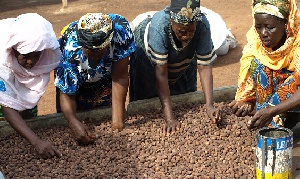Dr. Martha Awo of the of the Institute of Statistics, Social and Economic Research, ISSER, has expressed fears that the Shea industry may be out of business and called for intervention of Government, chiefs and other stakeholders to save the situation.
She said lands where Shea trees are grown are being sold out to private estate developers as the trees are cleared leaving residents who engage in the picking of Shea nuts redundant.
Dr. Awo said this in an interview with TV3's Northern Regional Correspondent, Zakaria Abdul-Kadiri after she presented research findings by her outfit at a workshop in Tamale in the Northern Region.
She spoke on the theme, "Shea in Ghana: understanding the opportunities, challenges and implications of engaging Shea producers in the global value chain.”
Dr. Awo added that mostly old women are those engaged in the picking of the Shea nuts in the bush as the youth show little interest in the job pointing out that “there cannot be any sustainability in the business if the youth are reluctant to get involved.”
She said the processes are cumbersome, adding that with a bowl of Shea nut sold for one Ghana Cedi, it is not a lucrative business for the youth to be involved.
She called for pragmatic efforts to reserve lands for the cultivation of the Shea trees as community farms adding that the crop is also cultivated in the sub-Region and suggested that there should be some collaboration between governments in the region to stabilize prices of the commodity.
Dr. Awo pointed out that Shea butter has some oil contents which can be used to produce chocolate which has cocoa butter elements “in addition to its usage in the cosmetic industry.”
She said “no single woman of those who pick the nuts in the bush is able to acquire for herself any landed property like a house or a vehicle. This is because the maximum amount of money an individual gets in a year is an average of GHC 300 and the little they get is used to support the family.”
Dr. Wolfram Laube of GTZ, a German NGO, said women involved in the picking of the seeds are being exploited by private buyers who count on the ignorance of women on the price of the nuts in the world market.
He said last year about $ 24m of the products were exported in the country and called on government to put in place measures to protect the interest of the women adding that the “poverty level of women is being mitigated and not eradicated rendering the women financially weak.”
Dr. Joshua Yidana of the University for Development Studies, UDS, said 60 percent of the nuts are left in the bush because the women cannot go very far for them as they risk snake bites and attacks by Fulani herdsmen who are reported to be raping them.
He said Fulani herdsmen can incite their cattle to attack people and appealed to chiefs to regulate the grazing areas of the Fulanis for the security of the Shea nut pickers.
Shea nut picking is one of the sources of income for majority of women in Northern, Upper East and Upper West Regions of the country.
Business News of Tuesday, 16 June 2015
Source: tv3network.com

















